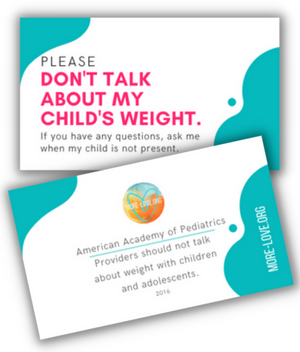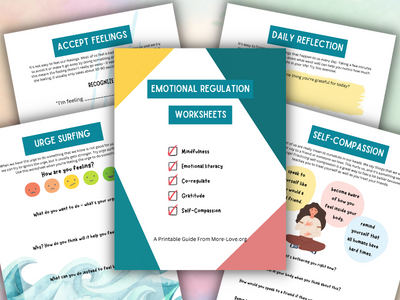
Often you need to make various types of doctor’s appointments during eating disorder recovery. Sometimes they are related to the eating disorder, sometimes not. Either way, doctor’s appointments can be very stressful when you have an eating disorder. So how do you handle it if you need to take your child who has an eating disorder to the doctor?
While doctors are driven to care for their patients, many are unfamiliar with the complexities of eating disorders. I don’t believe doctors mean harm to their patients. However, I do know doctors can accidentally cause harm by saying and doing things that encourage the eating disorder.
How doctors can go wrong with eating disorders
Here are some things that may accidentally happen during doctor’s appointments that can exacerbate an eating disorder:
1. Automatic weigh-ins
Most doctor’s offices do an automatic weigh-in. However, this can be triggering for a person who is in eating disorder treatment and recovery. Seeing, hearing, or otherwise encountering weight gain can spark a desire to lose weight. Also, finding out about weight loss may provide a “rush” of success and entrench eating disorder behaviors even deeper. It’s common practice to avoid sharing weight information with a person who has an active eating disorder and/or is in recovery. Many people who have fully recovered from their eating disorder continue to avoid automatic weigh-ins due to their triggering nature. In a surprising number of cases, weight is not required to provide healthcare.
Don’t Talk About My Child’s Weight Cards
You can give these cards to the nurses and doctors at your child’s pediatrician’s office. The American Academy of Pediatrics recommended against doctors discussing weight given the high risk of weight stigma and eating disorders. You get to make choices about how your child’s weight is dealt with at the doctor’s office!
2. Talk about weight
Unless your child’s doctor is trained in eating disorders, they may accidentally make unhelpful comments about your child’s weight. In some cases, they may be dismissive of weight. Doctors may suggest that a child who is in weight recovery is “fine” and doesn’t need to gain more weight. Or they may become concerned if the weight recovery goal is higher than they think it should be. There are a lot of landmines when it comes to talking about weight with a person who has an eating disorder. Eating disorder recovery specialists are trained to handle the nuance of talking about weight, but most other people, including doctors, will, unfortunately, make mistakes.
3. Talking about food as good/bad or suggesting more/less
Doctors often try to make helpful suggestions about eating. They may discuss food in terms of “healthy” and “unhealthy” choices. They may also ask about how many servings of dairy, vegetables, or other nutrients your child is consuming. While understandable, this sort of talk can be very triggering for a person in eating disorder recovery. Similarly, casual comments about eating more or less can be upsetting for a person in eating disorder recovery. Remember that while doctors are very knowledgeable about bodies and physiology, they have limited training in eating disorders and mental health. They really want their patients to be healthy. But the impact of uninformed food and diet talk can be disruptive to the process of eating disorder recovery.
4. Dismiss your concerns
Some parents bring their children to a doctor to help them diagnose and validate concerns about an eating disorder. But this can, unfortunately, backfire. Few doctors are qualified or comfortable enough to make a non-weight-based diagnosis. In other words, unless your child is at a level of medical underweight that they require hospitalization, a doctor may not recognize their eating disorder symptoms as serious. Except in specific cases, your child’s doctor may not be the best person to diagnose your child. But they can often participate in treatment in other ways. It’s just important to know what to expect. You want to avoid being in a situation in which your child’s doctor dismisses your belief that they have an eating disorder in front of your child.
A note for parents who have an adult child: I recognize that much of this advice will not be applicable to your situation. Most adult children do not bring a parent to the doctor with them. Hopefully, this article will at least give you some ideas of things you can talk to your child about before and after they see a doctor so you can help them avoid dangerous situations and/or process them if they do occur.
How to prepare for a doctor’s appointment with an eating disorder
First, unless your doctor is specifically trained in eating disorders, you should expect to do some level of appointment preparation and management. While doctors want to care for their patients, they receive very little training about eating disorders and mental health in medical school.
Any mistakes they make are most likely coming from the best intentions. But the outcome of any mistakes can nonetheless be serious.
Here’s how to prepare for a doctors appointment if your child has an eating disorder:
1. Set realistic expectations
Recognize that without special training, your child’s doctor is not an expert in the treatment of eating disorders. This means that while you can of course consult the doctor for your child’s health, they may not be the best person to make a diagnosis and support you through recovery. Unless you are seeing a specialist, the best people to guide your child’s treatment will likely be a team of a psychologist and a dietitian, with possibly a psychiatrist and a parent coach. This team may ask you to get your doctor involved in checkups, but it’s unlikely that they will expect your doctor to provide guidance and care when it comes to actually treating and managing the eating disorder.
Emotional Regulation Worksheets
Give these printable worksheets to grow more confident, calm and resilient and feel better, fast!
- Self-Esteem
- Self-Regulation
- Mindfulness
- Calming strategies
2. Know what you’re asking for
It’s best if you’re clear about your intention for the visit. Are you looking for a general checkup? Or maybe you’re going in for something unrelated to the eating disorder like a sprained ankle or sore throat. On the other hand, you may be taking your child in for blood work and weight to assist their treatment team. Know what you are looking for, and if it’s not an appointment that is specifically designed to support your child’s eating disorder treatment team, you can let the doctor do what they’re best at, like treat that sprained ankle or sore throat, without talking too much about the eating disorder. I’m not saying you can’t talk about it, but it’s best to be clear about the purpose of your visit. Remember that visits are typically 10-15 minutes long, so it’s helpful to have a clear purpose in mind before you begin.
3. Ask for accommodations
If your doctor’s appointments are specifically about your child’s eating disorder, then ask your child’s treatment team to either contact the doctor directly or assist you in how best to approach the appointment. If the appointment is not about the eating disorder and the doctor is not an eating disorder specialist, then you can do the following:
- Ask that your child not be weighed or, if it’s required, to be blind weighed, making sure the weight does not appear on post-visit paperwork
- Ask the doctor not to talk about your child’s weight during the visit. If they have any questions, direct them to you or your child’s treatment team
- Ask the doctor not to talk about food and eating during the visit. If they have any questions, direct them to you or your child’s treatment team
4. Anticipate stress and discomfort
Going to the doctor when you have an eating disorder is typically an emotionally stressful experience. Most people who have eating disorders are highly concerned with their health and also suffer from anxiety. It’s best if you can anticipate their stress and spend time before the appointment helping them to feel safe and connected with you. This pre-work will go a long way to supporting your child’s experience at the doctor and avoiding major trigger events. If you need some help, check out this eBook on emotional regulation.
During doctors appointments with an eating disorder
During doctor’s appointments, you can advocate for your child who has an eating disorder by making sure that if weight is taken, it is not shown, discussed, or printed on aftercare materials. Additionally, you can intervene if the doctor begins a discussion of weight or “healthy” food and eating.
If your child’s doctor is doing an assessment for your treatment team, obviously the eating disorder will be a topic of discussion. Just keep a close eye on it and try to guide the doctor if you feel they are getting into dangerous territory. Remember that you know your child best right now, and it’s OK to intervene if necessary.
Additionally, if your visit is not related to the eating disorder, you can keep the visit on-topic. While your child’s doctor should know they have an eating disorder, as long as they are getting treatment, it’s OK for the visit to focus on the sprained ankle or whatever you came in for.
Most importantly, try to keep your own emotional state regulated during the appointment. Remember that your emotional state impacts how your child feels, so do some work in advance and during the appointment to stay as regulated as possible. If you or your child becomes emotionally dysregulated during the visit, be sure to do some after-care to get you both into balance. Seek to reconnect and coregulate as soon as you can.
You can do this!
Parenting a child with an eating disorder is challenging, and so is navigating the health system. Doctor’s visits should be safe and healthy, but it’s best to prepare and remain vigilant to optimize your child’s experience given where they are right now.
We have been trained to defer to doctors at all times, and they certainly deserve our respect. However, your first priority is your child’s recovery. You know what your child can and can’t tolerate right now, and it’s OK to speak up and politely redirect a doctor if needed.

Ginny Jones is the founder of More-Love.org, and a Parent Coach who helps parents who have kids with disordered eating and eating disorders. Combining science, compassion, and experience coaching hundreds of families, she helps parents understand what’s going on with their kids’ eating behaviors and teaches them the science-backed skills to heal kids’ relationship with food, improve their body image, and feel better about themselves, their relationships, and life in general.
Ginny has been researching and writing about eating disorders since 2016. She incorporates the principles of neurobiology and attachment parenting with a non-diet, Health At Every Size® approach to health and recovery.




Automatic weigh-ins are the worst! I almost had to argue with a nurse because she didn’t want to accept my refusal, even after telling her I’m in eating disorder recovery. Eventually, I told her my therapist would object her weighing me and THAT rationale she accepted but she wouldn’t respect mine!
I’m really sorry that happened to you. I know how stressful it is! xoxo